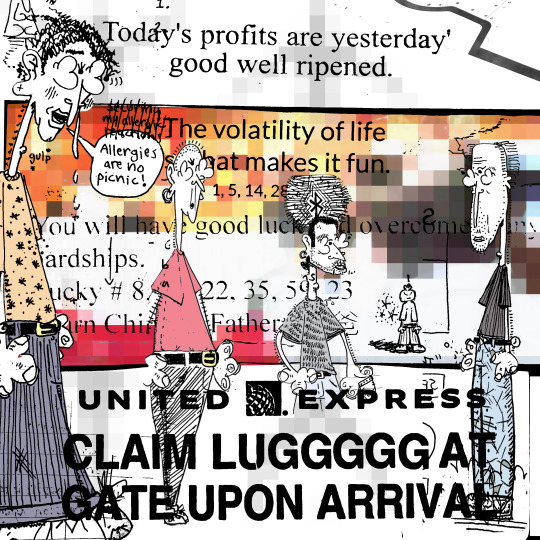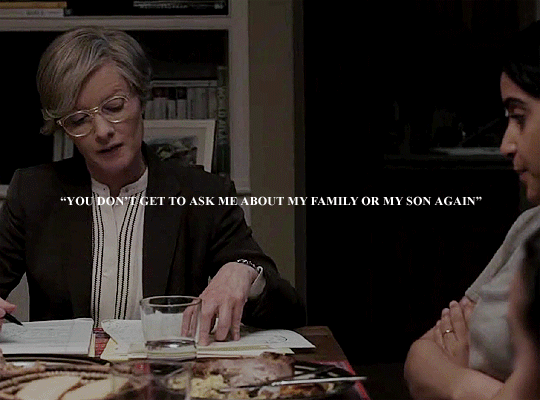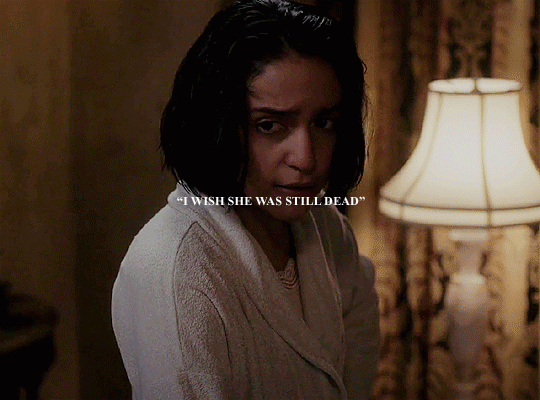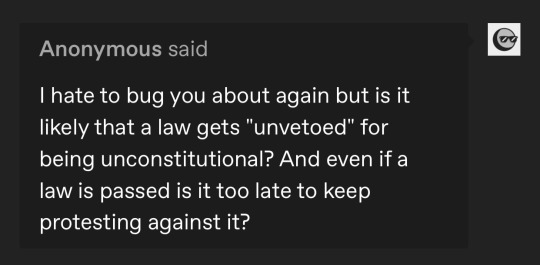#united express
Text

United Express BAE 146
10 notes
·
View notes
Photo

I started this mixed media piece a while ago and never continued working on it. Most of it is made out of drawings from my school notebook and fortune cookie fortunes I was collecting. Don’t know if I’ll finish it, but I’m honestly fine with where I left it.
3 notes
·
View notes
Text

are we brave enough for gwawn
#no they have never breathed the same air. yes they would be INSTANT soulmates. trust me#dawn would LOVE gwens drawings and weird journal poetry and cool self expression.#gwen would LOVE dawns mysterious vibe and her love of nature (lest we forget gwen is a nature loving girlie too!!)#werid girls unite basically#tdi#total drama island#td gwen#td dawn#dare i…#gwawn#also yes i will confess i was the gwawn anon on real td takes
788 notes
·
View notes
Text



these asks are about a month apart but I'm glad the three of us were thinking about his little fantasy of looking at cows and petting them at this moment in time 😌
@princessfroslass psssssst
#criminal minds#spencer reid#criminal minds fanart#omg is that cow gigantic#this is like when I drew Roxy and made her bigger and bigger and a second later she's an absolute unit#not the best at animal proportions 😂#or expressions#Spencer is like 🥹#and the cow is like 🧍
149 notes
·
View notes
Text




"When [Aleida] opens the door [to Margo's office after the JSC bombing], I think the immediate fear is, "Margo died, and I never got to tell her that I love her." There's shock there, so she isn't thinking straight, but I think that's what it is — that she's been arguing and fighting with this person, and at the end of the day, she just wants to tell her that she loves her."
#For All Mankind#forallmankindedit#Coral Peña#Aleida Rosales#Margo Madison#ya think Aleida managed to mention she now also has a daughter during the one month period where she was playing#love note express for Margo and Sergei or did she invite her over to dinner and spring a wholeass child on Margo on top of everything else#no but I love how Coral's s3 interview is perfectly in synch with what we see in s4#AT THE END OF THE DAY SHE JUST WANTS TO TELL HER THAT SHE LOVES HER#it was never about the stupid engine designs and it sure af was not about Margo betraying the United States#Aleida couldn't care less she's not loyal to 'murica it's like Coral said her loyalty lies with Margo#THAT'S the betrayal that hurts. Margo not confiding in her. then leaving her. then not contacting her. is what seems impossible to forgive.#then suddenly she's back and it makes everything worse. and for a bit their s3 fight continues in s4.#until they manage to break the cycle. because 'you're not him' and 40something Aleida isn't 28 y/o Margo
116 notes
·
View notes
Text





Happy Halloween from hhu because monster is so halloween coded and such a banger!!!
Na na na na na na na na na na na na na na~
#seventeen#svt#scoups#wonwoo#mingyu#vernon#hiphop unit#kpop#my art#is this maybe a little late for halloween?? probably but whatever#i made them the monsters they mentioned in the song ehehe#coups is a zombie wonu frankenstein's monster and vernon is a vampire#gyu didn't really mention a specific monster in the song tho or maybe i just missed it skdkakkdks#but anyways i made him a werewolf because dogboy so ofc#coups ended up looking the scariest i like how he turned out so much akdaldkaljdm#mingyu being the only one smiling tho akzkjskak i was drawing him with a serious expression too at first#but i was struggling and i wanted his teef to show for the sharp monster teef and also winky smiley gyu is just so cute aldkakkskjd#i gave his shadow very angy eyes thoooo#n e ways i love to draw a hand and do fucked up shit with the blending modes lol#it looks so cool and has a kindy spooky vibe#also made a version without the hands because i worked hard on those faces y'all better see it lol#and then i combined them into a gif ehe i think it looks cool
103 notes
·
View notes
Text
Buddy Daddies Interviews with Ayase and DURDN:
This will just be the quick notes version, with bits of information that I personally found to be the most interesting, I’ll link to the full interviews below in the comments.

Ayase wasn’t given any specific orders about the song, but since it was an OP, he wanted to do a song that had some speed to it, instead of a quiet feeling.
Since Ayase knew that the plot would be about the main characters raising a child, he wanted to use the idea of them confronting their ideas of “love” and how, internally, they were constantly changing, as themes for the song. But, Ayase notes that he also wrote a bit about his own life and his own feelings towards the responsibility of loving others as additional themes that link to the work.
The title of the song, SHOCK, comes from the expressing the impact of the story in Buddy Daddies. The idea that, when you are so emotionally distraught and desolate that you turn away from personal feelings like love, and then you meet someone that has a huge impact on your way of thinking and feeling. That’s the SHOCK. And that’s how it links backs to both the story of the anime and the impression of said story.
Ayase also noted that the series is a bit of a dark comedy, and he found that to be interesting/amusing, and that the series has a bit of a foreign feel to it, and there were interesting points that he had not seen before.
----

DURDN is a group made up three people: Baku, SHINTA, and yacco. When asked what their first impression of Buddy Daddies was, SHINTA answered “familial love.” the love for one’s family. Because of that, they wanted to write a soft, enveloping song.
Their past songs have been “not so bright” and usually have a “shadowy” side to them, but they didn’t want those aspects to appear in My Plan. Since it was about an anime, they want a cheerful sound to it.
yacco was the one in charge of writing the lyrics, and they admit to being confused and worried at some points, because they wanted to write a song that was positive and filled with happiness, but they had never written something like that before. It seems they also didn’t have a very happy family life (they didn’t experience that “family love” found in Buddy Daddies), so they wrote the song more from the POV of “this is the kind of family that would make me happy.”
SHINTA was in charge of the tracks and arrangements, so they wanted to give Buddy Daddies a 90s feel. So the song is arranged with an eye towards Japanese City Pop and pop songs based in that era.
They were able to see the full-version of the show, that was not yet completed, so they feel that they were able to get a general idea of the story from that, and write a song that captured the worldview of Buddy Daddies. They also apparently entered the song as the OP too, they really wanted their song to get picked, lol.
They’ve noticed an increase in overseas fans and English comments, leading Baku to realize that anime really is quite popular overseas.
#Buddy Daddies#BD#KazuRei#Kazuki Kurusu#Rei Suwa#Miri Unasaka#DURDN#Ayase#interview#official stuff#translation#English translation#yeah#the OP definitely seems to be more about Kazuki and Rei themselves#while the ED is about Kazuki Rei and Miri as a family unit#I also had a feeling#that the title SHOCK#was meant to express that sentiment#so I'm glad Ayase confirmed that#lol
158 notes
·
View notes
Text

Hogwarts Express, Amusement ride, United states: The Hogwarts Express is an 1,800 mm broad gauge cable railway, people mover, and attraction within the Universal Orlando Resort in Orlando, Florida, United States. Wikipedia
51 notes
·
View notes
Text
I've been seeing various posts about KOSA on my dash today, and based on the research I've conducted, I can safely say that as the High Priest of the United Satanic Liberty Front, I'm in solidarity with a lot of you. I support the rights of LGBTQ+ youth, and I hereby oppose KOSA.
#KOSA#stop KOSA#KOSA bill#bad Internet bills#Kids Online Safety Act#Kids Online Safety Bill#Stop bad Internet bills#support liberty#United Satanic Liberty Front#Liberty#USLF#Satan#Satanism#Satanic#Hail Satan#Lucifer#666#stop religious abuse#support the First Amendment#First Amendment#Freedom of Speech#Freedom of Expression
20 notes
·
View notes
Text
It reminds me of why the stop the steal people lost their legal challenges to Biden’s election. It’s not that it’s impossible for right wing people to use legal architecture to halt democratic processes (cf Bush v Gore), it’s that they did it in an openly stupid and nonsensical way. In terms of American fascism I think the lessons they’re learning re: interacting with institutional power is that they can’t use twitter posting tactics in the courtroom
#I don’t know how salient this analysis is because like also america is a well developed fascist state in many ways#like in terms of large scale fascistic processes those things are already finely honed#but there’s a particularly unstable element being expressed domestically#eg qanon stop the steal unite the right etc etc#that seems to be losing legal battles not because fascism is structurally excluded from those processes#but that they aren’t being sophisticated with their legal challenges#I mean I guess also another conclusion to be made is that this is just the logical output of a well developed fascist state#you are going to get these fantastical spasms of reactionary violence and legal resistance at home#as stupid and ineffectual as it appears to be#like these are also in a sense the ‘new normal’ of an openly fascist state#anyway these are messy thoughts not fully formed. the more I learn about this topic the less I feel like I actually know
45 notes
·
View notes
Note
Any updates on the current status of HB3?? You're like, the only source I trust when it comes to this as others seem to be misinformed
I will be honest. There is not much information (that I can find) out there on House Bill 3 other than what it is and how it works.
However, there are no new updates on that bill in particular at this time.
For those unaware, House Bill Three is a Floridian bill that prohibits any minors 15 and under from having accounts on social media. Minors older must have parental permissions. Age verification is required. Ron DeSantis signed off on that bill and it will be enforced January 1st of 2025.
And as for other concerns.



1: House Bill Three was being protested against. However it was passed anyway.
2: I am unsure if a VPN will allow you to bypass the law. And even then, I'd imagine that you would. face major legal repercussions if you were caught.
3: It is possible to revoke a law. It is never too late to protest an unjust low, look back at any point of history with major protests and know that to be true.
However, tacking on my own thoughts
Nothing will be done unless we speak out. Protest takes many forms. And congress will not listen unless it affects them.
#political#politics#unbiased journalism#us politics#journalism#stop internet censorship#kosa#stop kosa#asks#anti kosa#house bill 3#florida#floridian politics#florida politics#freedom of mind#free internet#freedom of the press#freedom of expression#freedom of speech#america#united states
26 notes
·
View notes
Text
The social media company formerly known as Twitter has been accused in a revised civil US lawsuit of helping Saudi Arabia commit grave human rights abuses against its users, including by disclosing confidential user data at the request of Saudi authorities at a much higher rate than it has for the US, UK or Canada.
The lawsuit was brought last May against X, as Twitter is now known, by Areej al-Sadhan, the sister of a Saudi aid worker who was forcibly disappeared and then later sentenced to 20 years in jail.
It centers on the events surrounding the infiltration of the California company by three Saudi agents, two of whom were posing as Twitter employees in 2014 and 2015, which ultimately led to the arrest of al-Sadhan’s brother, Abdulrahman, and the exposure of the identity of thousands of anonymous Twitter users, some of whom were later reportedly detained and tortured as part of the government’s crackdown on dissent.
Lawyers for Al-Sadhan updated their claim last week to include new allegations about how Twitter, under the leadership of then chief executive Jack Dorsey, willfully ignored or had knowledge of the Saudi government’s campaign to ferret out critics but – because of financial considerations and efforts to keep close ties to the Saudi government, a top investor in the company – provided assistance to the kingdom.
The new lawsuit details how X had originally been seen seen as a critical vehicle for democratic movements during the Arab spring, and therefore became a source of concern for the Saudi government as early as 2013.
The new legal filing comes days after Human Rights Watch condemned a Saudi court for sentencing a man to death based solely on his Twitter and YouTube activity, which it called an “escalation” of the government’s crackdown on freedom of expression.
The convicted man, Muhammad al-Ghamdi, 54, is the brother of a Saudi scholar and government critic living in exile in the UK. Saudi court records examined by HRW showed that al-Ghamdi was accused of having two accounts, which had a total of 10 followers combined. Both accounts had fewer than 1,000 tweets combined, and contained retweets of well-known critics of the government.
The Saudi crackdown can be traced back to December 2014, as Ahmad Abouammo – who was later convicted in the US for secretly acting as a Saudi agent and lying to the FBI – began accessing and sending confidential user data to Saudi Arabian officials. In the new lawsuit, it is claimed that he sent a message to Saud al-Qahtani, a close aide to Mohammed bin Salman, via the social media company’s messaging system, saying “proactively and reactively we will delete evil, my brother”. It was a reference, the lawsuit claims, to the identification and harming of perceived Saudi dissidents who were using the platform. Al-Qahtani was later accused by the US of being a mastermind behind the murder of the journalist Jamal Khashoggi in 2018.
“Twitter was either aware of this message – brazenly sent on its own platform – or was deliberately ignorant to it,” the revised lawsuit states.
Twitter, now X, does not respond to questions from the press.
The Guardian contacted the company lawyer in the case, Ben Berkowitz of Keker, Van Nest & Peters, but did not receive a response. The Guardian also contacted Dorsey’s new company, Block, Inc, to request a comment from the former Twitter chief executive, but did not receive a response.
After Abouammo resigned in May 2015, he continued to contact Twitter to field requests he was receiving from Bader al-Asaker, a senior aide of Mohammed bin Salman, for the identity of confidential users. He made clear to the company, the lawsuit alleges, that the requests were on behalf of his “old partners in the Saudi government”.
The lawsuit also alleges that Twitter had “ample notice” of security risks to internal personal data, and that there was a threat of insiders illegally accessing it, based on public reporting at the time.
Twitter “did not simply ignore all these red flags … it was aware of the malign campaign”, the lawsuit claims.
On 28 September 2015, Twitter received a complaint from a Saudi user that their accounts had been compromised. But, the lawsuit alleges, the company did not act to bar one of the Saudis who was later accused – Ali Hamad Alzabarah – from having access to confidential user data, even though he had accessed the user’s account previously.
Saudi Arabian authorities, the lawsuit alleges, would formally follow up with Twitter once it received confidential user data from its agents working inside the company, by filing so-called EDRs – or emergency disclosure requests – in order to obtain documentation that confirmed a user’s identity, which it would then use in court. Often those EDRs were approved on the same day.
In May 2015, when two Twitter users tweeted about the kingdom in a way that al-Asaker found objectionable, Albabarah accessed the users’ data within hours. EDRs about the users were then sent, and automatically approved by Twitter, the lawsuit alleges.
Between July and December 2015, Twitter granted the kingdom information requests “significantly more often” than most other countries at that time, including Canada, the UK, Australia and Spain, the lawsuit alleges.
On 5 November 2015, just days before Twitter was confronted by the FBI about its concerns about a Saudi infiltration of the company, it promoted Alzabarah – now a fugitive living in Saudi. In response, Alzabarah sent his Saudi government contact, al-Asaker, a note, conveying his “unimaginable happiness” for the promotion. The note, the lawsuit claims, is evidence that Alzabarah believed al-Asaker had “arranged” or “been influential” in connection to the promotion.
Once Twitter was made aware of the FBI’s concerns, it put Alzabarah on leave and confiscated his laptop, but not his phone, which he has used extensively to contact his Saudi state contacts. Twitter, the lawsuit alleges, “had every reason to expect that Alzabarah would immediately flee to Saudi Arabia, which is exactly what he did.”
The US attorney’s office in San Francisco, which handled the case, did not respond to The Guardian’s request for comment on the company’s handling of the matter.
Twitter would later notify users who had been exposed, telling them their data “may” have been targeted, but did not provide more specific information about the scale or certainty that the breach had, in fact, occurred.
By “failing to give this crucial information, Twitter put thousands of Twitter users at risk,” the lawsuit alleges, claiming that some may have had time to escape the kingdom had they understood the risk. Even once Twitter was aware of the breach, it continued to meet and strategize with Saudi Arabia as one of its vital partners in the region. Dorsey met with bin Salman about six months after the company was made aware of the issue by the FBI, and the two discussed how to “train and qualify Saudi cadres.”
“We believe in Areej’s case and we will zealously prosecute it – but what she wants most is for Saudi Arabia to simply release her brother and let him re-join his family in the United States,” said Jim Walden, a lawyer representing Al-Sadhan from Walden Macht & Haran. “Were that to happen, she and Abdulrahman would gratefully resume their lives and leave justice in God’s hand.”
#us politics#news#Twitter#x#jack dorsey#saudi arabia#human rights abuses#united states#united kingdom#canada#Areej al-Sadhan#Human Rights Watch#freedom of expression#Muhammad al-Ghamdi#prince Mohammed bin Salman#Saud al-Qahtani#Ahmad Abouammo#fbi#Jamal Khashoggi#the guardian#world politics
32 notes
·
View notes
Video
158740 @ Inshes by Alexander
Via Flickr:
1B26 Inverness to Edinburgh Waverley. Class 158 Express in Scotrail Saltire livery heads south on the HML. Seen here passing the UHI Campus building between Inverness and Smithton.
#158740#UK trains#DMU#diesel#multiple unit#unit#2 car#Class158#express#scotland#scotrail#saltire livery#1B26#Inverness#Edinburgh#waverly#inshes#UHIcampass#rails#railways#railway#trains#train#traction#snow#winter#highlands#cold#nikon#D5300
38 notes
·
View notes
Text
Yes it's form a conservative source. But it's one of the few articles that doesn't focus on reproductive purchasers who felt entitled to a child.
by Emma Waters, @EMLWATERS
Olivia Maurel was 30 years old when an ancestry DNA test confirmed what she had known all along: she is the product of a costly commercial surrogacy contract. In Olivia’s case, the woman that her parents paid to gestate and birth Olivia is also her biological mother.
In a recent article with Daily Mail, Olivia shared how “becoming a parent myself — entirely naturally, in my mid-20s — has only crystallized my view. The sacred bond between mother and baby is, I feel, something that should never be tampered with.” After going viral for her testimony before the parliament of the Czech Republic, Olivia now campaigns for the universal abolition of surrogacy.
In the United States, only three states prohibit or do not enforce commercial surrogacy contracts. One of the states, Michigan, is poised to overturn their ban on surrogacy-for-pay through a nine-bill “Access to Fertility Healthcare Package.” Legislators are tying their efforts to the national conversation on in vitro fertilization in hopes of garnering additional support. I detail the concerns with this legislation in detail here, but suffice it to say it undermines motherhood by reducing the intimate relationship between a woman and the child she carries to a highly-lucrative rental agreement.
Several well-respected researchers and pundits claim that surrogacy does not harm children. Yet we know very little about its long-term impact on a child’s psychological well-being.
Most of those who assert that surrogacy is psychologically harmless rely on a longitudinal study by Susan Golombok, Professor Emerita of Family Research, and former Director of the Centre for Family Research at the University of Cambridge. She is the author of We Are Family (2020), a synthesis of 40 years of research on non-traditional family structures—same-sex, single parent by choice, and the use of all forms of assisted reproductive technology, including third-party conception. She concludes that such arrangements pose no additional harm and can benefit children.
Professor Golombok’s “Families Created Through Surrogacy” study began in 2003 and assessed parental and child psychological adjustment at ages 1, 2, 3, 7, 10, and 14. The impact of this single longitudinal study on both public opinion and policy cannot be overstated. To date, it is the only study that specifically examines the surrogate-born child’s psychological adjustment, as well as the only study to do so over an extended period. It is also the only research on child psychological well-being that policymakers in New York used to argue for the legalization of commercial surrogacy.
Professor Golombok’s sample of surrogacy families comes from the General Register Office of the United Kingdom for National Statistics (ONS) and from the UK’s “Childlessness Overcome Through Surrogacy” (COTS) agency. The original sample included 42 surrogate-born children but declined to a mere 28 children by age 14. The study relied on a group of families formed through egg donation and children born of natural conception to serve as the comparison groups.
With such a small sample size, and some families participating inconsistently year-to-year, the study itself runs the risk of selection bias and non-representative outcomes. The study lumps both children born through gestational surrogacy and traditional surrogacy together, too. This means some surrogates are both the genetic mother and the child's gestational mother.
Additionally, only altruistic surrogacy is legal in the UK, so these arrangements do not involve surrogates who legally receive an additional sum of money, beyond generous reimbursements. For context, surrogacy-for-pay brings in an additional $25,000 to $70,000 in the United States, which may affect how a child views his or her conception, gestation, and birth.
In each study, the scholars rely on the mother’s own assessment of the child’s well-being. It is not until age 14 when scholars begin to directly ask children questions to assess their self-esteem.
Overall, Professor Golombok concludes that children born from surrogacy agreements of any sort do as well, if not better, psychologically than their natural-born peers.
For ages 1, 2, and 3, Professor Golombok finds that parents in surrogacy families showed “greater warmth and attachment-related behavior” than natural-conception parents. One explanation for this, as Professor Golombok’s notes, is that “parents of children born in this way [may] make a greater attempt than parents of naturally conceived children to present their families in the best possible light.” Such a bias seems likely, given that parents may feel the subconscious desire to justify their uncommon path to parenthood.
By age 7, both surrogate-born children and donor-conceived children in the control group were doing noticeably worse than their natural-born counterparts. This is the point when many children learned of their biological or gestational origins. The scholars note that this corresponds with adoption literature as the period in a child’s life when they begin to comprehend the loss of one or both biological parents. What goes unnoted, however, is that unlike adoption, surrogacy is the intentional creation of a child for the express purpose of removing the child from his or her gestational and/or biological parent(s).
Beginning at age 10, scholars report that the child’s psychological adjustment returns to a relatively normal state compared to the natural-born children, but the study itself reports little data compared to previous papers. By age 14, when the study concludes, the remaining 28 children seem to fare about the same as natural-born children, despite slightly more psychological problems reported.
Despite these methodological limitations, Professor Golombok’s data from this longitudinal study remains the basis of child psychological adjustment research on surrogacy. Examples of this may be found in prominent pieces such as Vanessa Brown Calder's review of surrogacy at the Cato Institute or Cremieux Recueil's widely shared Substack with Aporia Magazine. Their conclusions that surrogacy confers “no harm” to the psychological well-being of the child are premature, to say the least.
In Calder’s article, she cites three studies in her discussion on the psychological well-being of surrogate-born children. A quick review of each study shows that these authors rely solely on Professor Golombok’s longitudinal study data to draw their conclusions.
In Recueil’s Substack, "Surrogacy: Looking for Harm," he primarily relies on Golombok’s work to claim that “psychological harm appears to be minimal.” Again, this statement is premature and formed on limited data primarily from her longitudinal study. The other five citations in the “Psychological Outcomes for Kids” section tell us little about the psychological well-being of surrogate-born children.
Recueil twice cites “Are the Children Alright? A Systematic Review of Psychological Adjustment of Children Conceived by Assisted Reproductive Technologies,” from 2022. Of the 11 studies that examine the intersection between surrogacy and child psychological outcomes, they fall into three categories:
the longitudinal study by Professor Golombok
child outcomes compared with other children born from assisted reproductive technology, not compared with natural-born children
studies that examine the impact of non-traditional parenting types, such as lesbian mothers or gay fathers, on the well-being of the child. The impact of surrogacy is not directly assessed; it is simply mentioned as a requirement for male-to-male family formation. Of these three categories, the only studies that directly address the claims that Recueil makes are the research of Professor Golombok, which he already cited before these additional studies.
Hence, the widespread claim that surrogacy does not harm the psychological well-being of children primarily relies on a single longitudinal study of 42-to-28 surrogate-born children by the intended mother’s own assessment. That’s it.
This isn’t to say we should discard Professor Golombok’s study. But honest scholars and lawmakers should be far more modest in claiming that surrogacy does not harm the psychological well-being of children.
The most accurate conclusion regarding the psychological adjustment of surrogate-born children is that we do not have enough data to draw a conclusion either way, especially not in favor of surrogacy itself. When the well-being of children is at stake, lawmakers and researchers should employ the utmost scrutiny before advocating for any form of childbearing.
Children rightly desire to please their parents, and there are few conversations more complicated than questioning the method one’s parents chose to bring one into the world. There is reason to believe that many surrogate-born children will not have the emotional or mental maturity to understand their conception and gestation until they are much older.
There is a huge difference between no harm and no known harm. Regardless of one’s stance on surrogacy, we should be able to agree that we need more data and reporting requirements to enable researchers to assess the impact of surrogacy contracts on the well-being of children. In my view, a single six-part longitudinal study does not justify this practice.
Emma Waters is a Senior Research Associate for the Richard and Helen DeVos Center for Life, Religion and Family at The Heritage Foundation.
#Anti surrogacy sunday#Surrogacy exploits women#Babies are not commodities#Surrogacy is human trafficking#michigan#Access to Fertility Healthcare Package#General Register Office of the United Kingdom for National Statistics (ONS)#Childlessness Overcome Through Surrogacy” (COTS)#Surrogacy is the intentional creation of a child for the express purpose of removing the child from his or her gestational and/or biologica#Small sample size for a study#The results are based on answers given by a biased parent#We need more studies before experts can say weather or not surrogacy impacts children#There is a huge difference between no harm and no known harm
14 notes
·
View notes
Text
it kind of bothers me that witcher fans don’t really unite under sapkowski’s name like other fans of fantasy authors do (e.g. “tolkien fans”).
in practically any other fandom of fantasy books, save for the particularly rancid authors known for their disappointing and shameful behavior or views (e.g. jk r*wling), it’s just regular business to say the author’s name. but sapkowski’s name is treated like a dirty word in the witcher fandom, for really no good reason…
it must be asked — what is stopping us from doing so?! why don’t we call ourselves sapkowski fans. it would be much easier than saying “i’m a fan of the witcher, but only the books, i don’t consider the various adaptations canon, etc. etc.” … “half a hundred words, when three are enough!!”
#i was just thinking about this today. can we call ourselves andrzej sapkowski fans beginning now or what#note that i said GOOD reason#meaning that it’s not like sapkowski is a conservative#the witcher books#txt#like sapkowski has done and said stuff that i dont approve of or like#the alcoholism at cons for instance hem hem (though ive also heard that type of behavior was standard)#he’s said a few cringey things about women and lesbians but nothing worse than your typical old guy would#specifically i’m referring to the ‘i dont hate women i - he he he - positively love them!’ which is actually just everybodys granddad lmao#and the ‘i dont know about why my characters are lesbians - though i can be sure im not one’#that kind of stuff just makes me shake my head and laugh#but its not like he has done heinous shit like some of these authors running around loose out here#i mean i think it’s mitigated in part that he’s a private person with no twitter account#i also disgaree with his points from there is no gold in gray mountains but i also dont know enough abt what hes talking about to understand#understand FULLY at least. i understand some but not all. i think i understand just enough to disagree#but he has expressed a lot of progressive points which also come through in his series#what i mean is: hes not a terrible person. so why do people act like he is#ALSO i think if we united under his name then there would be more inter-series fans#ive always wondered where the fans of the hussite trilogy are (online). is there an online fanbase?#and if we do that then we can get more and better translations hopefully#like theres still no official translations for a ton of his short stories
82 notes
·
View notes
Text
You think they're gonna retcon Oni Lloyd?
It's a sucky thought, especially since we got so little time with it while the Elemental Dragons at least got 3-4 seasons, but I've been thinking about it. The only times Lloyd gets extremely pissed is when it has something to do with his father (ending of Season 4, Seasons 8-10, etc.), with Crystallized showing this at its peak.
The thing is, I dunno if they'll be able to put Garmadon in life-threatening danger again for something like this to happen again. Maybe they'll explore Lloyd's darker side or have him start to get madder and learning to temper his anger, I dunno, but unless they have an arc like that or just have him able to turn it on at will (kinda lame), I dunno how soon we'll see it again, if we even do.
We'll probably see it again because of Rule of Cool and money reasons, but I still wanted to express my rambling thoughts on this shenanigan
#could you imagine he starts getting snappy and the ninja#and a rift lowkey starts forming#kinda like a bigger version of what happened when he held the Forbidden Scroll in S11#kind of been playing with this idea for a Morro AU#Lloyd hangs out with him and learns to express/control his anger instead of holding it in I dunno#also Morro would be back lol#anyways#how do you think they bring back Oni Lloyd without making it overpowered?#the dragons at least were too big too slow and disappeared due to the fear thing#what consequences to the Oni form do you think they'll make?#oni lloyd#ninjago#ninjago united#ninjago spoilers#lloyd montgomery garmadon#lord garmadon
86 notes
·
View notes
